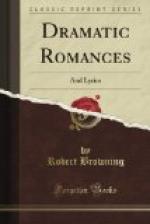Notes: “The Glove” gives a transcript from Court life, in Paris, under Francis I. In making Ronsard the mouthpiece for a deeper observation of the meaning of the incident he is supposed to witness and describe than Marot and the rest saw, characteristic differences between these two poets of the time are brought out, the genuineness of courtly love and chivalry is tested, and to the original story of the glove is added a new view of the lady’s character; a sketch of her humbler and truer lover, and their happiness; and a pendent scene showing the courtier De Lorges, having won a beauty for his wife, in the ignominious position of assisting the king to enjoy her favors and of submitting to pleasantries upon his discomfiture. The original story as told by Poullain de St. Croix in his Essais Historiques sur Paris ran thus: “One day whilst Francis I amused himself with looking at a combat between his lions, a lady, having let her glove drop, said to De Lorges, ’If you would have me believe that you love me as much as you swear you do, go and bring back my glove.’ De Lorges went down, picked up the glove from amidst the ferocious beasts, returned, and threw it in the lady’s face; and in spite of all her advances and cajoleries would never look at her again.’’ Schiller running across this anecdote of St. Croix, in 1797, as he writes Goethe, wrote a poem on it which adds nothing to the story. Leigh Hunt’s ‘The Glove and the Lions’ adds some traits. It characterizes the lady as shallow and vain, with smiles and eyes which always seem’d the same.’’ She calculates since “king, ladies, lovers, all look on,” that “the occasion is divine” to drop her glove and “prove his love, then look at him and smile”; and after De Lorges has returned and thrown the glove, “but not with love, right in the lady’s face,’’ Hunt makes the king rise and swear “rightly done! No love, quoth he, but vanity, sets love a task like that!’’ This is the material Browning worked on; he makes use of this speech of the king’s, but remodels the lady’s character wholly, and gives her an appreciative lover, and also a keen-eyed young poet to tell her story afresh and to reveal through his criticism the narrowness of the Court and the Court poets.
12. Naso: Ovid. Love of the classics and curiosity as to human nature were both characteristic of Peter Ronsard (1524-1585), at one time page to Francis I, the most erudite and original of French medieval poets.
45. Clement Marot: (1496-1544), Court poet to Francis I. His nature and verse were simpler than Ronsard’s, and he belonged more peculiarly to his own day.
48. Versifies David: Marot was suspected of Protestant leanings which occasioned his imprisonment twice, and put him in need of the protection Francis and his sister gave him. Among his works were sixty-five epistles addressed to grandees, attesting his courtiership, and the paraphrase of forty-nine of the Psalms to which Ronsard alludes.




